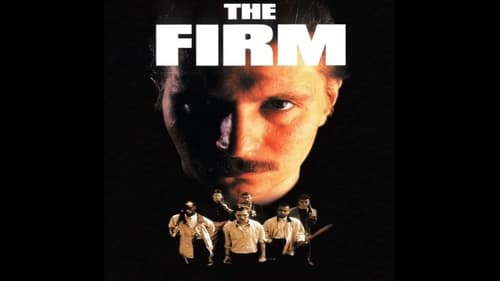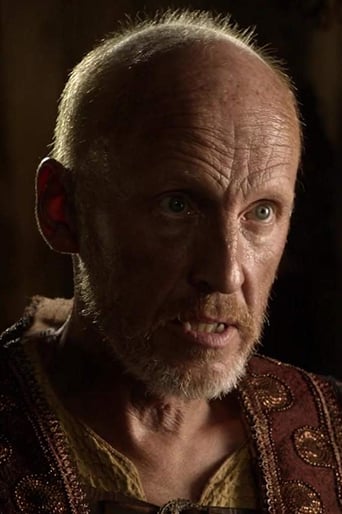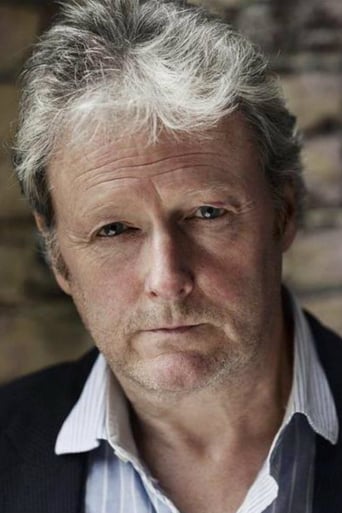LouHomey
From my favorite movies..
Breakinger
A Brilliant Conflict
Kodie Bird
True to its essence, the characters remain on the same line and manage to entertain the viewer, each highlighting their own distinctive qualities or touches.
Janae Milner
Easily the biggest piece of Right wing non sense propaganda I ever saw.
johnnyboyz
It's such a buzz to discover a British film made two decades ago and such a buzz to enjoy it to the degree that I did. It can be said that 1988's The Firm works more than a piece of nostalgia and a gritty look at the mentality of a football hooligan who seems to have it all but risks loosing it anyway rather than a piece of inspired and original film-making but then again, you cannot hold that against it. The reason for this is because The Firm is a 70 minute long, BBC produced, made for television feature rather than your typical production.At a time when British film was getting by in the latter years of Thatcher's reign and in a decade when two British films won best picture back to back (Chariots of Fire and Ghandi, respectively), The Firm works as a hark back to a time when football violence was still a predominant problem in England and abroad because of English fans. There is a scene in which someone on television talks about hooligans being smarter and more organised in their violence; something the lads in the firm dismiss but of course they go on to comply with later on when they meet up with rival firms during a proposal. The fact of the matter is; when you watch modern efforts like The Football Factory, the mere opening scene in that is an organised series of meetings of Chelsea fans as they aim to assault a pub entertaining rival fans. Likewise; to give you an idea of how bad the hooliganism was at the time of The Firm, it was so bad that during the 1990 World Cup in Italy, authorities and organisers had to make sure all of England's group games took place in Cagliari, on the island of Sardinia so that if there was any trouble, the airports and docks would be shut off and the hunt would contain the hooligans to the island's limits.But whilst The Firm is an entertaining and gripping film, it suffers from its constraints and budget, as well as its run time. Gary Oldman is on absolutely commanding form as Bex Bissell, a man to rival that of Billy Bright from The Football Factory in terms of aggression if not physique but Oldman does not need physique as his acting and ability to get across a psycho persona is there already; there are shades of Agent Stansfield, a character he would play in Léon, six years later. The Firm is a great idea and one that is itching to perhaps be re-done; the idea that the 'job' that is being a hooligan is going through its own patch of modernity; the idea that no matter what, you honour those who have fallen and those who you at least respect on the battlefield – something that's echoed in the closing speech by England fans; it's all very tribal and ritual as we remember and fight for those lost on the battle field. "The hooligans have jobs" says the television; "They have wives, children and lives" it also says – the hooligans even have suits and nice cars, something that is confirmed when they all meet up initially; they resemble gangsters organising crime, not brainless fans up for a fight when/if a match seems to be dying out.The Firm is a film that has 'That's Amoré' playing over its opening, a song we perhaps associate with gangster films, the Italian mafia for instance. The film isn't plotted but that isn't a bad thing by any means; we are treated to dialogue to set the scene of who these people are, something which sparkles when Bex and rival firm members exchange insults upon meeting and we get an emphasis on Bex's home life and home life in general – a lot of this film takes place in Bex's house where he struggles to clarify why he is what he is. His wife, Sue (Manville), constantly asks the question to the point that you think Bex will lash out. Sue is a woman and a strong character to have in such a film which is set in such a male dominated world. I say the film is not plotted but in a way it is, albeit in a loose and reliant fashion. Epic and gritty realism is the basis for the opening but whilst that is retained until the end, the film is a series of scenes revolving around why one, then two, then three people have to drop out of the firm that will take on a rival firm for the right for something else. That something else is the right to lead the joined England firm at the European Championships in West Germany, 1988.So with this in mind, Bex and his crew, who are made up of people like Mickey from Only Fools and Horses and Sol from Snatch, come up with a series of reasons that they cannot fight for the right to have Bex as the England firm leader. The idea for the narrative is a little silly; let three firms bash the hell out of each other for the right to see who can orchestrate the right to bash the hell out of continental Europeans, but the scenes work; Bex's loose mentality works as a constant threat; the cause and effect holds up to the end and we get to see lots of exterior shots of London, 1988. If by the closing hurrah it feels like it has outstayed its welcome, its because due to the shocking twist that happens, the West Ham firm members will probably be spitting blood in an itching orgy of lust for revenge but you don't get that feeling – instead, everyone comes together; the West Ham firm with a bad case of amnesia. Too bad it was all for not much as England faded away out of Euro '88 without so much as a win.
Rick Reid
What a shame that Alan Clarke has to be associated with this tripe. That doesn't rule it out however; get a group of lads and some Stellas together and have a whale of a time running this one again and again and rolling around on the floor in tears of laughter. Great wasted night stuff. Al Hunter homes in on a well publicised theme of the late 80s- that hooligans were well organised and not really interested in the football itself- often with respectable jobs (estate agent???). But how Clarke can convince us that any of the two-bit actors straying from other TV productions of low quality (Grange Hill) or soon to go on to poor quality drama (Eastenders) can for a nanosecond make us believe that they are tough football thugs is laughable. Are we really to believe that the ICF (on whom of course the drama is based) would EVER go to another town to fight with just SIX blokes?The ICF would crowd out tube stations and the like with HUNDREDS. Andy Nicholls' Scally needs to be read before even contemplating a story of this nature. The acting is appalling and provides most of the laughs- Oldman is so camp it is unbelievable. Most of them look as though they should be in a bubble of bath of Mr Matey. A true inspiration to anyone with a digital video camera who thinks they can make a flick- go for it.
saigonpieman
I have tried without success to buy this film through friends who have visited England during the years that I have been away. Despite the fact I avoided football through the 'boy' years, I thought this film was fantastic, and Gary Oldman showed his talents in everything he made after it.
Lexo-2
Different from the similarly-entitled Tom Cruise vehicle in much the same way that a punch in the head is different from a solicitor's letter, this is where the late great Alan Clarke - Britain's best TV director and perhaps the best British director of the 70s and 80s - finally got to work with Gary Oldman. Oldman is Bex, leader of a gang of football hooligans. His crew go head-to-head with another bunch of guys from Birmingham. That's pretty much the story.The insight, for which respect must be paid to screenwriter Al Ashton, is that these guys aren't poor white trash but professional men. Bex is an estate agent and when we first meet him he is selling a house to a couple by admitting to them frankly that it's rubbish. He shows them in and says "If this house don't sell itself I'm a monkey's uncle." Then he walks away down the path and, for a moment, scratches his armpits and gibbers like a chimp - an inspired bit of improv from Oldman.This was Oldman before he got into his period of being an American Ham - sharp, keenly observational and immensely likeable even though the character he's playing is a complete scumbag. There's a lot of violence, and violence in a Clarke film isn't a rowdy punchup, it's Stanley knives in the face and iron bars in the groin. A gun gets used towards the end, which I personally found a bit unrealistic.One of the most remarkable things about this movie is that at no point do you actually see a football. These guys aren't football fans, they're in it for the fighting. They were the energies that Margaret Thatcher unleashed and then affected to deplore. Guys like Bexy own much of Britain now.When Oldman got tired of acting in bad American cop thrillers, he showed what he'd learned from Clarke by making Nil By Mouth. The boy done good. The Firm was Clarke's last film; a year later he was dead from cancer. Don't miss it.







